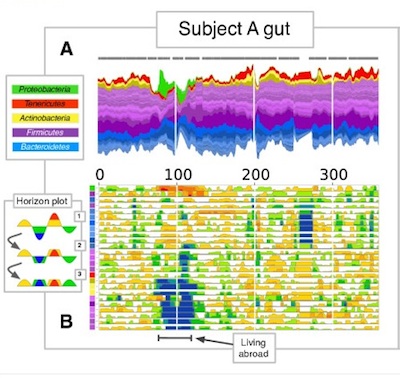 A new longitudinal study of the microbiome from researchers at Harvard and MIT demonstrates how the ubiquity of a smartphone enables research that would have been much more difficult previously. In the study, two patients tracked a number of health factors on an iPhone app for a year and also took stool samples almost every day. Researchers analyzed the bacteria in the stool samples alongside the health tracking data, to see what impact the subjects' lifestyle had on their microbiome, or the ecosystem of bacteria living in their digestive tract.
A new longitudinal study of the microbiome from researchers at Harvard and MIT demonstrates how the ubiquity of a smartphone enables research that would have been much more difficult previously. In the study, two patients tracked a number of health factors on an iPhone app for a year and also took stool samples almost every day. Researchers analyzed the bacteria in the stool samples alongside the health tracking data, to see what impact the subjects' lifestyle had on their microbiome, or the ecosystem of bacteria living in their digestive tract.
Subjects used a modified version of a database app called TapForms to track 13 parameters: ailments, bowel movements, daily notes, diet, exercise, fitness, location change, medication, mood, oral hygiene, sleep, urination, and vitamin intake. The two subjects were selected partially based on a screening process for people who would be meticulous about data entry.
"Our findings suggest that although human-associated microbial communities are generally stable, they can be quickly and profoundly altered by common human actions and experiences," the researchers wrote.
Most of the data scientists had subjects collect turned out to be irrelevant to the microbiome. That's still valuable information, as it allows future studies of this kind to be more focused in their tracking.
"[I]t is perhaps surprising that given the multiple of tracked host variables, we did not observe more correlations between host behavior and the microbiota," the researchers write. "For example, we did not observe extensive links between gut microbiota and variables like sleep, exercise, or mood. These findings suggest that future longitudinal studies of human microbiota will not have to exhaustively control for host behavior, as a wide range of lifestyle attributes are unlikely to broadly disrupt individuals’ microbiota."
Two things that did have big effects on the microbiome: diet and illness. The study found that the only major changes that happened to the subjects' microbiomes were related to big events. One subject took a trip to a developing country that triggered a major diet change, which shook up his microbiome. Interestingly, upon his return to the US his microbiome bounced back to its previous makeup. The other had become sick from salmonella poisoning. Even after he recovered from the illness, the makeup of his microbiome changed, with a new species taking over one that was eradicated by the salmonella bacteria.
On a day-to-day level, one of the only thing to cause a quick change in the microbiome was fiber intake, which could alter the ecosystem of the gut in a single day. Yogurt also produced statistically significant changes.
The study of the microbiome is a relatively new area of research, as is the use of quantified self tools to gather data on it. At TEDMED last year, both Calit2 founding director Larry Smarr and uBiome cofounder Jessica Richman talked about the potential for gathering new data on the human body by tracking health behaviors alongside microbiome data from stool samples.















